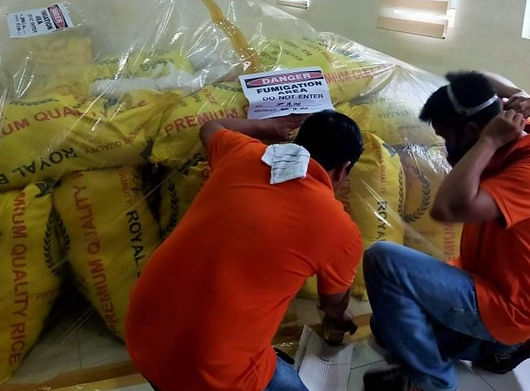Cebu Fumigation Service
Call 0991-8-526736
Cebu Fumigation Service
In many warehouses across Cebu, food commodities such as rice, corn, grains, cereals, flours, and spices are stored for extended periods, creating an ideal environment for cross-infestation by harmful pests like weevils or beetles. These destructive pests often infest food products from low-quality commodities, spreading to other items. Fumigation treatments in Cebu are crucial for safeguarding these goods, ensuring that pests do not compromise the quality of stored products like cereals, seeds, and herbs. Globally, the use of phosphine products for fumigation has proven to be an effective method for controlling these pests and maintaining the integrity of stored food products. Regular fumigation in Cebu helps protect against the potential damage that these pests can cause, providing long-term protection for your valuable commodities.

Efficacy of Cebu fumigation treatment
Phosphine fumigation has proven to be highly effective in many countries worldwide as a method of eliminating insects in stored commodities. This fumigation technique, when carried out according to the prescribed guidelines, does not contaminate the commodities being treated. Trials have shown that phosphine fumigation provides a relatively quick and efficient solution to eliminate infestations, ensuring that the food industry receives non-infested materials. However, for commodities stored long-term, re-infestation may occur, and additional fumigation may be necessary to maintain protection.
Fumigation conditions play a crucial role in the success of the treatment. The required dose depends on various factors, including the relative temperature and humidity, the temperature and moisture levels of the commodity, and the gas-tightness of the storage area or container. In situations where these conditions are not ideal, a longer exposure time may be required to ensure effective fumigation. The recommended exposure times listed in fumigation schedules are minimum periods, and most data on phosphine fumigation were collected under conditions of 60% humidity and 20°C temperature. Fumigation should not be conducted below 10°C, as lower temperatures can hinder the fumigation process.
Longer fumigation times generally lead to more effective treatment, as they allow the fumigant to penetrate the commodity fully. This is particularly important when the fumigant is not uniformly distributed, such as in the case of surface application or shallow probing. For bulk commodities in large storage areas, this extended exposure ensures that the gas reaches all areas and that pests are exposed to lethal concentrations of phosphine. However, extending exposure beyond 10 days is typically not recommended, as it becomes challenging to retain the fumigant for long periods. In certain cases, such as with well-sealed storage or goods wrapped in polythene, longer exposure periods may be possible. It's also important to note that exposure periods should be carefully controlled to avoid phytotoxicity, particularly when humidity levels exceed 12%.

